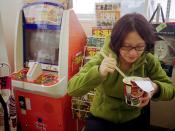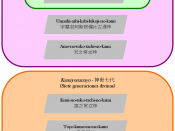Eastern Religions Elements Matrix (Confucianism and Shinto)Religion: Confucianism1.Country of origin : China2.Time of and key figures in origins: From the 2nd century BCE, Confucianism influenced behaviors of China politically, socially and intellectually.
â¢c.551-479 Life of Confuciusâ¢c.390-305 Life of Menciusâ¢c.340-245 Life of Hsun Tzu3.Other key figures and/or events from the origins to today:China faced a cultural revolution during 1966-1976, in which the temples and books were destroyed. In between 1990 and 2000, Confucian Classics were reintroduced in schools, Confucius's birthday was celebrated and International Association of Confucians was established.
4.Central beliefs: Confucians believe in worshipping ancestors and recognize reverence towards heaven. Confucianism emphasized on some of the principles such as education, good conduct, rigid hierarchy with defined roles, dismissal of the use of force and stability.
5. Central Rituals and Practices: Unlike other religions, Confucians recognize four passages of life. The four passages are the birth, reaching maturity, marriage and death.
At the time of death, the relatives cry out aloud to inform the neighbors and wear the clothes made of coarse material.
6.Understanding of God/gods: Confucianism does not emphasize on the existence of a god, although it recognizes and promotes harmonization with Tien (Heaven, Ultimate, Tao) through relationships with others and environments7.Key texts: The following texts were assembled by Chu Hsi (1130-1200 CE) during the Sung dynasty. They include:"The Si Shu or Four Books:The Lun Yu the Analects of ConfuciusThe Chung Yung or the Doctrine of the MeanThe Chung Yung or the Doctrine of the MeanThe Ta Hsueh or the Great LearningThe Meng Tzu the writings of Meng Tzu (371-289 BCE) a philosopher who, like Confucius, traveled from state to state conversing with the government rulers.
The Wu Jing or Five Classics:Shu Ching or Classic of History: writings and speeches from ancient Chinese rulersThe...


